Blog
A Father’s Bravery
Read the story of bravery and resilience about a loving father from Ukraine, Andrew.
June is a special month for World Relief North Texas. We not only get to honor the amazing father’s in our lives on Father’s Day, but we also celebrate World Refugee Day and World Refugee Awareness month. This is a month we celebrate the resilience, courage and strength of refugees around the world. The perfect way to highlight this month is by sharing a story of bravery and resilience from a loving father from Ukraine, Andrew.
Starting Over
Andrew is no stranger to starting over. In 2014 while living in South Ukraine with his family, Russia invaded the territory, displacing his family to South East Ukraine, where they lived for the following eight years. “We had a normal life between 2014 and 2022 after the first time we had to leave.”
Highlighted on news outlets across the world, 2022 brought more tragedy to Ukraine when Russia once again invaded. Unfortunately, this did not spare Andrew, again forcing his family to seek safety in Poland. “It was not easy to leave Ukraine. When we left (Ukraine) and lived in Poland, we lived with nine people in one room. Although we were safe, I knew God had another plan for us.” shared Andrew.
While in Poland, he met Katy* an American woman volunteering to serve those fleeing war in Ukraine. “I thought it was by accident that we met her, but in fact it was very important.” Andrew had decided the best option was to move his family to the United States. Katy offered to be his sponsor so he and his family could go to the U.S.
Heading to the U.S. was not an easy journey. From Poland to Spain and Spain to Mexico where they lived for two months in a tent while awaiting trial authorization.“Living in a tent in Mexico was quite an experience,” Andrew shared jokingly. After a long wait, they eventually made it to Texas.
Texas
“I showed up to the U.S. with nothing. I just had to figure it all out,” Andrew shared. When they arrived in Dallas, Texas one of the volunteers from Mexico picked them up from the airport. Andrew then found World Relief North Texas and our program that assists with housing. He was unaware of the difficulties he would face finding somewhere to live, but World Relief North Texas stepped in and helped with housing, cash assistance, and furniture. He was touched when his caseworker, Luke English, found and delivered furniture for him and his family.
Andrew was able to secure a job with the help of Jordan, an employment coordinator at World Relief. Jordan assisted Andrew in building a resume and found a job at the airport. This new job brought the income he needed to support his family. With the help of World Relief North Texas he has been able to have a good start in the U.S.
A Bright Future
Andrew is hopeful for his future in the U.S. and desires to apply for citizenship. “I have a dream to become a pilot, and I believe I will have the opportunity to study and try to become a pilot. It is my passion to be in the air,”.
He believes they will have lots of opportunities here. He loves his children’s school, that they have the opportunity to thrive here, and watching his son play soccer. They are learning English at school, and he believes they will do an amazing job. “I encountered many difficulties and hardships, but I’m now in a good environment and I like it here. I know I am in a good country and I believe I will make it here.”
Andrew is a reminder of hope. Through him we can celebrate the achievements made by those who have risked everything to provide safety for their families. For Andrew, and so many others, it is the reality of knowing he “cannot go back to Ukraine because my home is no longer there, it is not a safe place, and there is no way for me to have a job and provide for my family there.” Andrew is an example of resilience and strength, and we can all learn from men like Andrew.
We can also pray for those like Andrew, who have been displaced worldwide.
Learn how you can partner with World Relief North Texas to serve families like Andrew’s HERE.
A Prayer for Refugees
On June 14, a ship carrying migrants bound for Europe capsized in the Mediterranean Sea. Despite search and rescue efforts, hundreds are feared dead.
Even as we celebrate the strength and resilience of refugees this World Refugee Day, we lament that, for so many people seeking safety and a more hopeful future in a new land, the route is often marked by unnecessary hardship and trauma.
At World Relief, we are mourning with those who have lost loved ones in this tragedy, and we pray that God would give us the courage to not look away.
Will you join us in praying for refugees and those seeking safety around the world?
Father, I still my heart and mind to focus on you. Speak, your child is listening.
(Pause in silence and prayer)
Read: “The Lord your God is supreme over all gods and over all powers. He is great and mighty, and he is to be obeyed. He does not show partiality, and he does not accept bribes. He makes sure that orphans and widows are treated fairly; he loves the foreigners who live with our people, and gives them food and clothes. So then, show love for those foreigners, because you were once foreigners in Egypt.” — Deuteronomy 10: 17-19 (GNT)
How wonderful and powerful you are, Lord. Help me to reflect you and love like you.
(Pause in silence and prayer)
Today, I pray for those who are vulnerable and who may not be able to see your might and presence in their lives at this moment. I pray for those fleeing violence, wars and persecution; be their guide and comfort. For the millions of refugees around the world, waiting for justice and a new home.
(Pause in silence and prayer)
I pray for my city and community. May it be a place of safety, support and solace for those in distress.
(Pause in silence and prayer)
Lord, I think about our nation’s leaders and government. May they use their positions of power to work towards justice and righteousness.
(Pause in silence and prayer)
I pray for your church, that it would be a city on a hill, shining bright as a beacon for all who seek a new and better way.
(Pause in silence and prayer)
Lastly, I stand firm, covered with the armor of God, and pray against the work of the enemy, who comes to kill, steal and destroy.
(Pause in silence and prayer)
I offer this prayer to you and declare that yours is the kingdom and the power and the glory forever. Amen.
A Prayer for Refugees
Every June, we at World Relief invite people like you to join us in honoring World Refugee Day. And we believe one important way we can walk alongside our refugee neighbors is through prayer.
Prayer is a source of power and light in dark times. As we face the largest displacement crisis in recorded history with over 108 million displaced people and 35.3 million refugees worldwide, prayer is an essential part of our response.
For me, prayer has been integral to my growth as a Christian. It has given clarity to big life decisions, healing to sicknesses and physical pain and it has been a practice of vulnerability and unity within Christian community. Prayer is the simplest act of being and communicating with God our Father.
Will you join me today in his presence as we pray for refugees together?
Father, I still my heart and mind to focus on you. Speak, your child is listening.
(Pause in silence and prayer)
Read: “The Lord your God is supreme over all gods and over all powers. He is great and mighty, and he is to be obeyed. He does not show partiality, and he does not accept bribes. He makes sure that orphans and widows are treated fairly; he loves the foreigners who live with our people, and gives them food and clothes. So then, show love for those foreigners, because you were once foreigners in Egypt.” — Deuteronomy 10: 17-19 (GNT)
How wonderful and powerful you are, Lord. Help me to reflect you and love like you.
(Pause in silence and prayer)
Today, I pray for those who are vulnerable and who may not be able to see your might and presence in their lives at this moment. I pray for those fleeing violence, wars and persecution; be their guide and comfort. For the millions of refugees around the world, waiting for justice and a new home.
(Pause in silence and prayer)
I pray for my city and community. May it be a place of safety, support and solace for those in distress.
(Pause in silence and prayer)
Lord, I think about our nation’s leaders and government. May they use their positions of power to work towards justice and righteousness.
(Pause in silence and prayer)
I pray for your church, that it would be a city on a hill, shining bright as a beacon for all who seek a new and better way.
(Pause in silence and prayer)
Lastly, I stand firm, covered with the armor of God, and pray against the work of the enemy, who comes to kill, steal and destroy.
(Pause in silence and prayer)
I offer this prayer to you and declare that yours is the kingdom and the power and the glory forever. Amen.
Want to learn more about refugees and how you can celebrate their lives and stories this World Refugee Day?

Nou Huse works at World Relief as the U.S. Good Neighbor Team (GNT) Program Coordinator. She formerly served as the Volunteer and GNT Coordinator at World Relief Fox Valley. Before joining the World Relief team, she lived seven years abroad working in education and serving in urban missions. She aims to act justly, love mercy and walk humbly with God in all things.
What is the Displacement Crisis?
Today, about 6 million people live in refugee camps. They’ve managed to flee from the risk of persecution in their home country, and now they are forced to wait. Often, conditions in camps are less than subpar. Access to water and healthcare is difficult, and refugees are reduced to living in tents for years — or even decades at a time. Entire families and generations have been born and grown up inside camps originally meant for temporary housing. It’s often difficult to obtain citizenship or work authorization, and millions of refugees are stuck in limbo, hoping for a chance at a new opportunity.
The latest figures from UNHCR, the United Nations Refugee Agency, show that there are about 103 million displaced people worldwide in over 134 countries. Projected figures estimate that the number of displaced people will grow to 117.2 million in 2023. What is displacement and how does it affect our communities? Here is an overview of what it means to be displaced, and why we should care.
There are many different categories of displaced people.
Let’s start with the different legal statuses of displaced people. You may have heard terms such as asylum-seeker, refugee, or internally displaced person. These different statuses each have a strict legal definition, and each is given different rights and protections.
What is an asylum-seeker?
An asylum-seeker is a person who has left their country of origin and is seeking protection in another country. However, they have not yet been legally recognized as a refugee and are waiting for a legal decision on their asylum claim. When it was founded, the United Nations declared that seeking asylum from persecution is a human right, and doing so is clearly outlined in the Universal Declaration of Human Rights. All people, no matter their origin, have a right to live in safety.
The latest figures show that roughly 4.6 million asylum-seekers are waiting for a decision on their asylum claims. In the United States, the asylum process can take from around 6 months to several years.
What is a refugee?
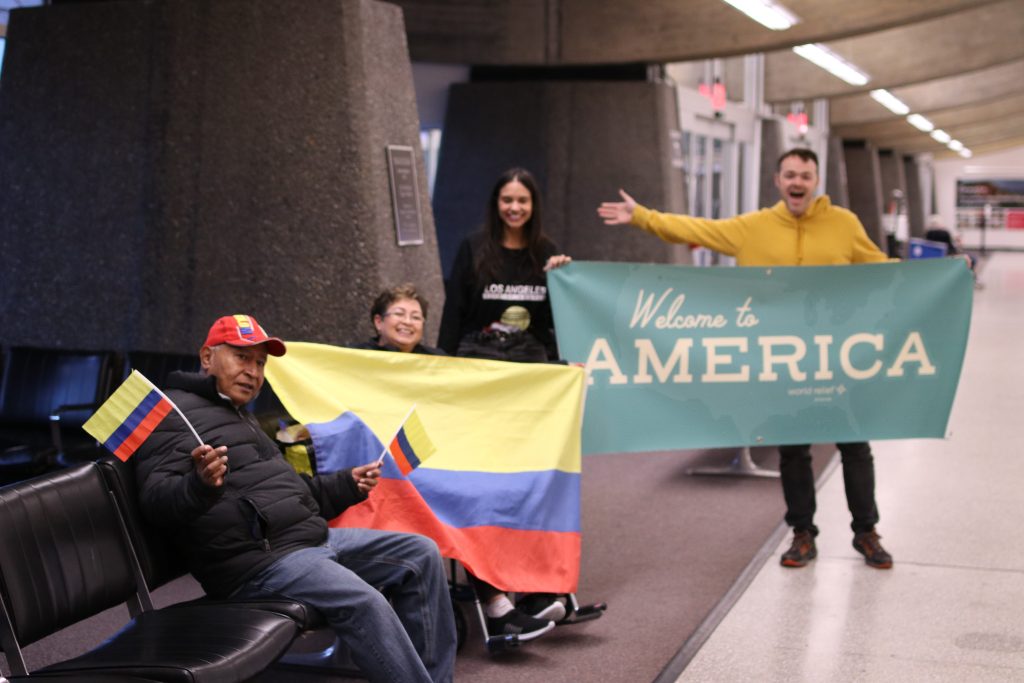
As of today, there are about 32.5 million refugees worldwide. The term “refugee” was defined by the 1951 Refugee Convention. Refugees are people fleeing conflict or persecution. They are unable or unwilling to return to their country of origin based on a fear of persecution based on five categories: race, religion, nationality, political opinion, or membership in a particular social group.
Once a person is granted refugee status, they are granted certain legal rights, again outlined in the 1951 Refugee Convention. For example, one key principle is the idea of non-refoulement. It ensures that states cannot send a refugee back to a country where they face serious threats to their human rights.
What is an internally displaced person?
Internally displaced peoples, or IDPs, are those who have been forced to leave their homes due to armed conflict, general violence, or human rights violations, yet have not crossed an international border. IDPs may not have the financial means to undertake such a journey. Many suffer from health conditions that render them unable to flee the country. Some IDPs are surrounded by conflict and stuck in a war zone.
IDPs face similar challenges to refugees and asylum-seekers, yet do not enjoy the same legal protections. They are often located in areas where aid organizations cannot reach them. Their national governments are responsible for their protection; yet these same governments may be unable to grant them protection or may simply refuse to do so.
While refugees most commonly make headlines, there are currently 70.1 million IDPs, more than twice the number of refugees.
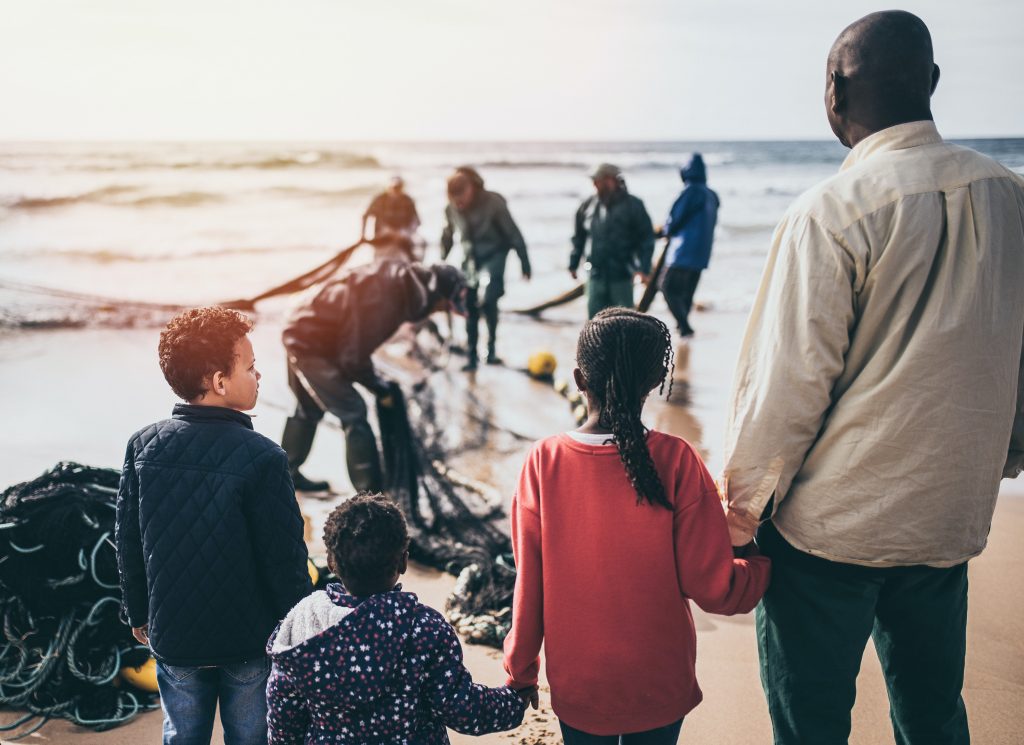
What is statelessness and how does it relate to displacement?
Statelessness can hinder freedom of movement, the ability to buy property, vote, open a bank account or even get married. Moreover, stateless people are excluded from government initiatives. Recently, many stateless people were left out of COVID-19 vaccinations or relief packages — they were considered invisible to governments.
Currently, there are around 700,000 Rohingya, an ethnic group which the state of Myanmar refuses to recognize and grant citizenship to. Rohingya are asylum-seekers and refugees like many others; yet they lack birth certificates, access to healthcare, and strict restrictions on their freedom of movement.
Other people in need of international protection
This category was created by UNHCR in 2022 and includes people who are outside of their country of origin, yet don’t qualify for typical refugee status. These people likely need international protection, especially protection against forced return, including access to basic services on a temporary or long-term basis. UNHCR estimates that there are about 5.3 million in need of other international protection.
How do countries address those left out of the refugee framework?
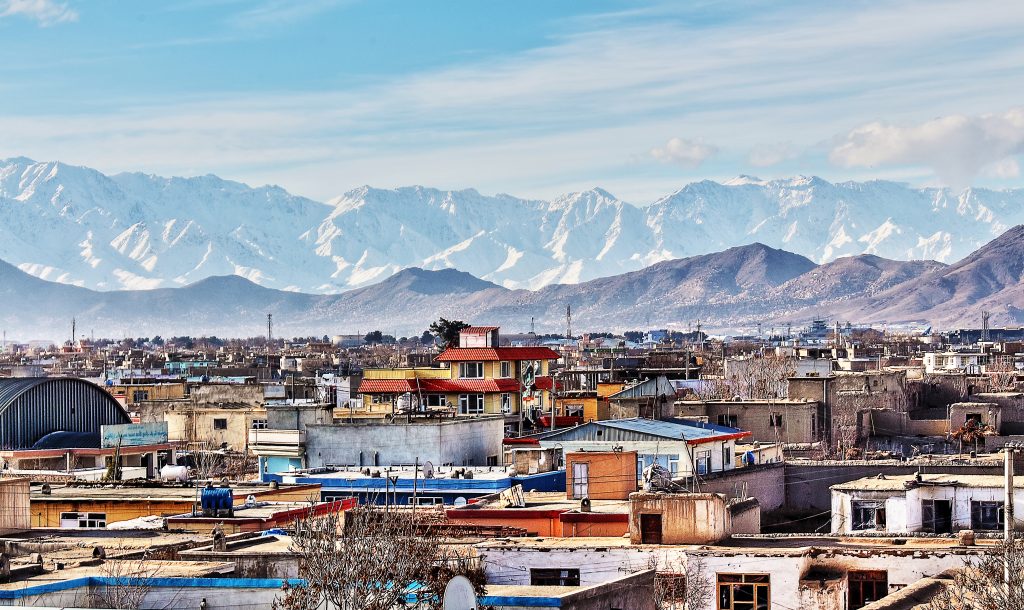
Modern displacement crises have put stress on the refugee framework, showing how its narrow definition, while important, can sometimes leave out equally vulnerable populations.
For example, the majority of displaced people in Venezuela and Ukraine do not qualify for refugee or asylum status, instead relying on temporary protection statuses or humanitarian parole – these statuses grant the recipient the right to live and work in a specific country, but only for a limited amount of time. However, countries can extend these statuses indefinitely.
The sudden withdrawal of U.S. troops from Afghanistan prompted the government to grant Afghans humanitarian parole to temporarily reside in the United States.
Addressing the displacement crisis means understanding its root causes.
Understanding the root causes of displacement can help us respond better to people’s protection and assistance needs. It helps us prevent crises which cause families to risk their lives in pursuit of safety. It ensures that today’s displaced will not be displaced again.
UNHCR splits factors leading to displacement into two major categories: drivers and triggers. Drivers are the underlying structural factors that combine, causing a crisis to erupt. For example, there may be:
- Environmental drivers, such as desertification, or climate change.
- Social drivers, such as limited education opportunities or inter-communal tensions.
- Political drivers, such as poor urban planning or corruption.
- Economic drivers, such as poverty, lack of access to markets, or lack of economic mobility.
Secondly, triggers are events precipitated by drivers that leave people little choice but to flee their homes. Armed attacks, natural disasters, or forced eviction are examples of triggers. Triggers themselves may not necessarily lead to displacement; however, their combination with various drivers create hostile and threatening situations. Triggers can also combine or occur in succession, creating a more complex situation.
Let’s examine a few situations around the world and why displacement is happening there.
Venezuela
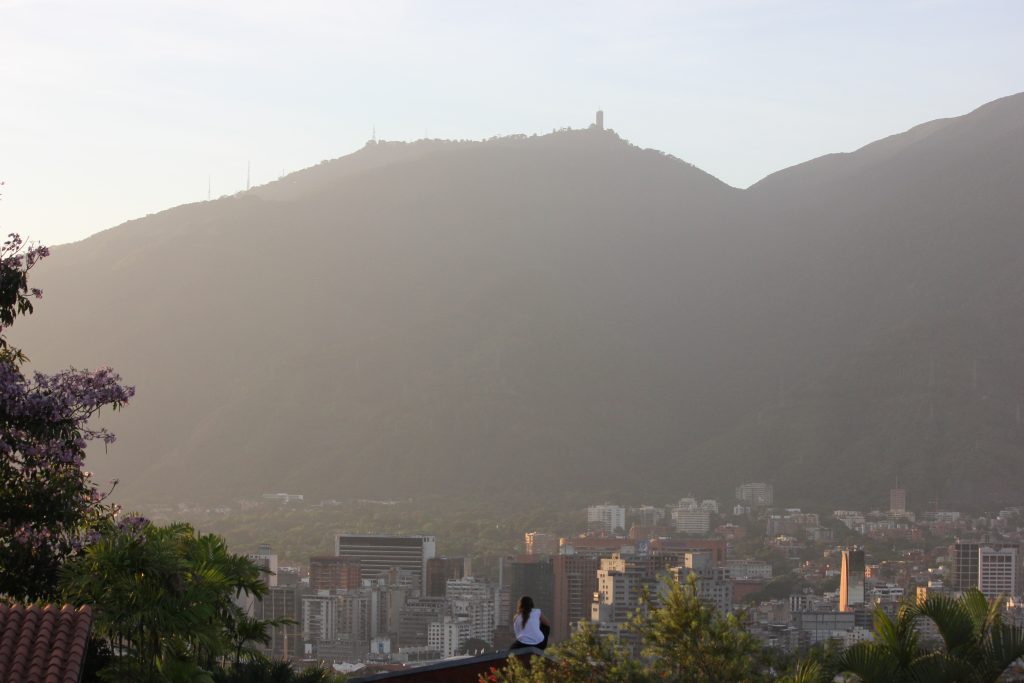
The displacement crisis in Venezuela can be traced back to the early 2010s, beginning with Hugo Chavez’s presidency. While rising oil prices enriched Venezuela and emboldened its economy, the lack of long-term economic planning became a main driver of future displacement. Today, Venezuela is marred by hyperinflation, and its population struggles to afford basic necessities. In 2018, inflation in Venezuela exceeded 1 million percent. Persistent economic sanctions have added to the already difficult situation in Venezuela, leading to many shortages of food and medical supplies.
Under Nicolas Maduro’s regime, the government began to crack down on anti-government demonstrations, resulting in many extrajudicial killings. In 2017, the UN reported over 5,287 killings by the Venezuelan National Police’s “Special Action Forces.” An additional UN report found that there were 1,569 killings in the first six months of 2019 alone. The Maduro regime has also made it exceptionally difficult for humanitarian agencies to operate within Venezuela, denying much aid to the starving population.
The COVID-19 Pandemic worsened health and safety conditions for the country, as Venezuela was not equipped to deal with the necessary health measures and lacked access to vaccinations or proper health services.
Half of the Venezuelan refugee and migrant population displaced around South America cannot afford three meals a day and lacks access to housing. Hundreds of thousands of Venezuelans remain without documentation or permission to stay in nearby countries, denying them access to basic rights.
Six years ago, Morella Perez-Suels left Venezuela to search for a better life in the U.S. Today, she serves as the Education Services Manager at World Relief Spokane, offering hospitality and education for refugees and migrants.
Unique Challenges in the Venezuelan Crisis
The Venezuelan displacement crisis is unique because very few displaced Venezuelans are refugees. Of the 7.13 million displaced, only 211,000 are registered refugees with the UNHCR. Approximately 1 million are asylum-seekers, primarily seeking protection in Peru and the United States. Since poverty and economic downturn are not enough to qualify for refugee status, migrants have fled to neighboring countries seeking temporary protective status and humanitarian parole.
Ukraine
The ongoing war between Russia and Ukraine has led to over 8 million refugees and migrants fleeing the country. There are approximately 17.6 million people in need of urgent humanitarian assistance, of which 6.5 million are IDPs.
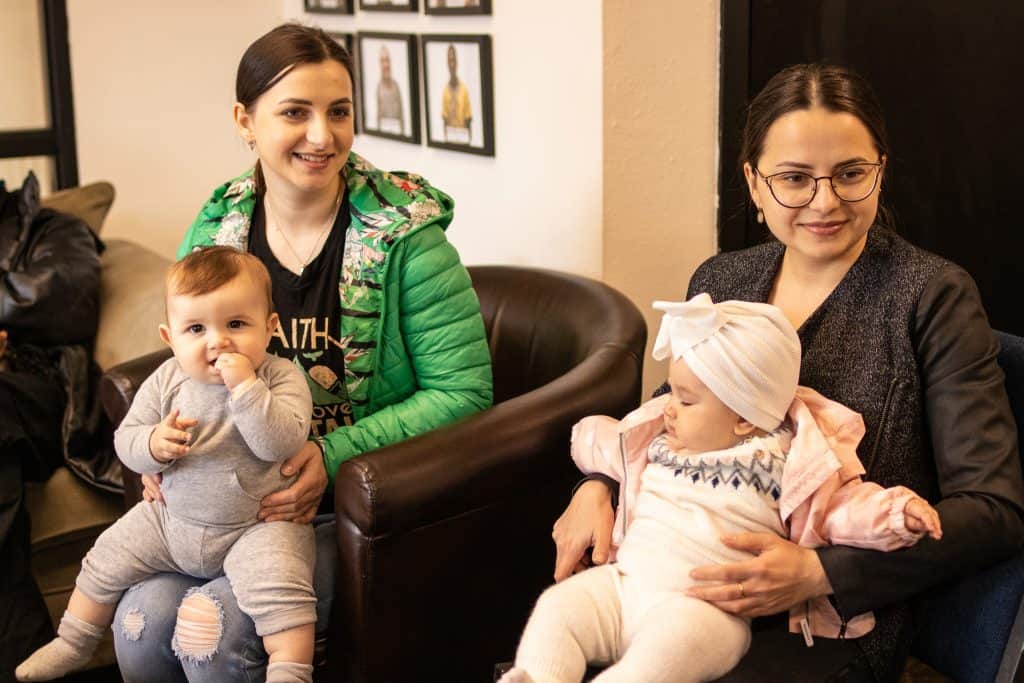
The war in Ukraine was no standalone event — years of political tension and a complicated history foreshadowed the crisis. Russia-Ukraine relations have been generally tense since Ukraine left the Union of Soviet Socialist Republics in 1991. In 2014, Russia capitalized on the political instability of the Ukrainian Revolution. The subsequent ousting of President Viktor Yanukovych allowed Russia to seize Crimea. The war in Ukraine destroyed vital infrastructure and led to many civilian casualties. These factors served as the trigger for the displacement we see today.
Of the 8 million displaced people outside of Ukraine, approximately 5 million have received temporary protection or similar national protection, according to the UNHCR. This means that UNHCR doesn’t legally recognize the majority of Ukrainians as refugees. Thankfully, as the city of Kyiv became safer, the UNHCR was able to repatriate over 4.5 million Ukrainians back to their homes.
Afghanistan
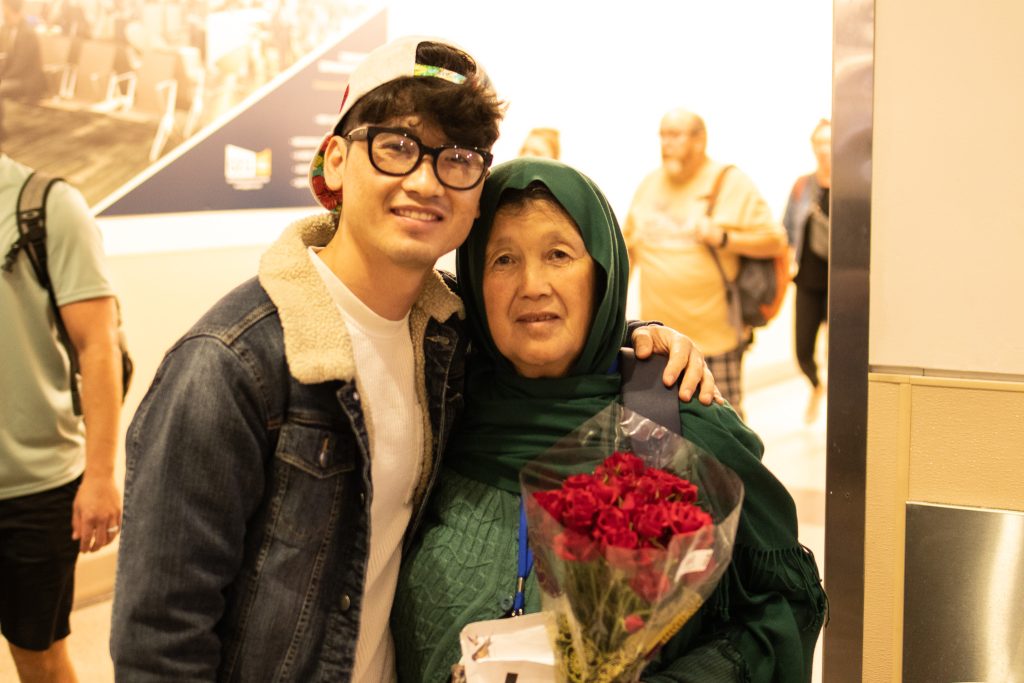
While the recent US withdrawal from Afghanistan in 2021 started the latest displacement crisis in that country, many prior factors had made the region unstable.
Afghanistan’s history is complex, and there are approximately 14 major ethnic groups within the country, leading to a unique system of governance while holds its own tensions.
As well, World Food Programme reports show that over half the population faces food insecurity and acute hunger. Afghanistan is the largest opium producer in the world and therefore faces many issues with drug trafficking and crime. Once the US withdrew and the Taliban again took control of the country, many citizens began to face persecution once more.
World Relief Spokane has been fortunate to support many Afghans throughout the last few years. In this blog post, Ibadullah Rasoli recounts his journey from Kabul to Spokane.
Why are displaced people important to our communities?
What does all of this have to do with us here in the United States? When this hardship takes place so far away from our communities, it seems difficult to understand why it is important that we support displaced people.
Supporting refugees and migrants is integral to American history and culture.
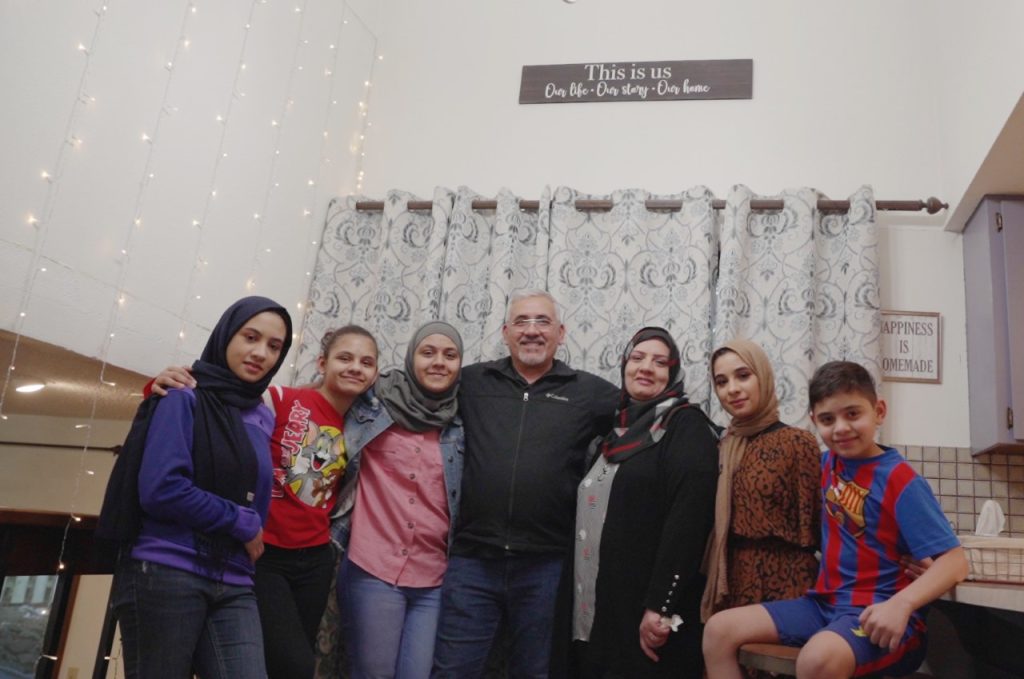
The United States is a country built on immigration. Cross-cultural understanding and collaboration are foundational pieces of American values. Today, approximately 44.8 million migrants live in the United States, making up 13.7% of the population. The United States has resettled over 3 million refugees since the Refugee Act was passed in 1980. Migrants deepen and enrich American culture and its diversity of experience, language, food, and customs. A study by the International Institute of St. Louis shows that refugees help improve cross-cultural understanding. They also help locals appreciate cultural diversity and see the shared values and beliefs across different cultures.
Refugees and migrants support local economies.
In 2017, the U.S. government conducted a study that found that refugee contributions exceed the initial cost of resettlement. From 2004-2015, the government spent $206 billion on refugees. During that period, refugees generated over $269 billion in tax revenue. It’s also important to note that refugees have a strong entrepreneurial spirit. Refugees are twice as likely to start a business than regular taxpayers.
We have a spiritual duty to be in solidarity with the oppressed and marginalized.
Jesus built his ministry on the principle of radical inclusion, of empowerment for the most vulnerable in society. He taught us that to fully capture God’s love, we have a duty to uphold the dignity of such people. Being in touch with God’s love means loving the stranger and the foreigner. Regardless of how far away a suffering community might be, we still have a duty to support them.
He makes sure that orphans and widows are treated fairly; he loves the foreigners who live with our people, and gives them food and clothes. So then, show love for those foreigners, because you were once foreigners in Egypt.” — Deuteronomy 10: 17-19
I was hungry and you gave me food, I was thirsty and you gave me drink, I was a stranger and you welcomed me.– Matthew 25: 35
The end of displacement begins with you.
Here at World Relief, our mission is to support people who have been forcibly displaced. Sometimes that means action in our local community, helping refugees adjust to life in America, teaching them how to use the bus system, or finding them work. Sometimes that means tackling poverty or malnutrition abroad and stopping displacement at the source.
World Relief relies on the generosity of its donors and volunteers. For World Refugee Day, please consider supporting our efforts.
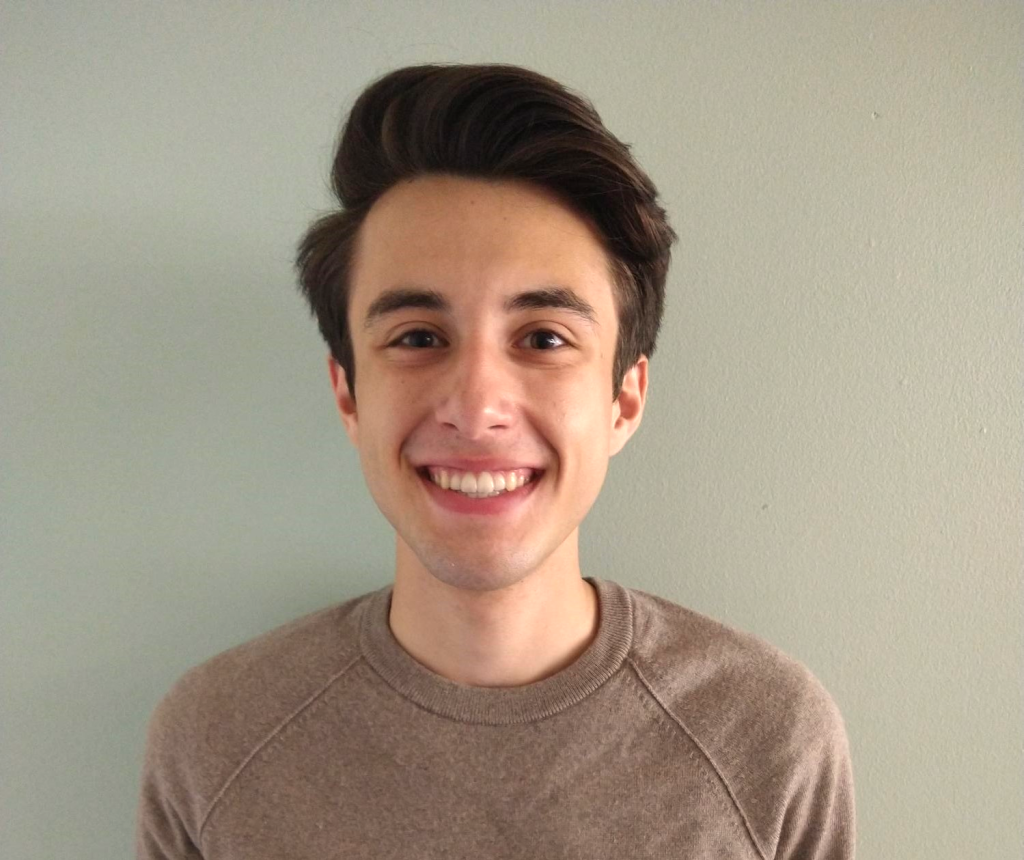
Antoine Herrbach is a 2023 Summer Intern for World Relief. He is a Senior at Gonzaga University, studying Political Science, History, and Economics.
5 Ways to Learn More About Refugees
“No one leaves home unless home is the mouth of a shark.”
— poet Warsan Shire
By Lisa Zanoni, World Relief Spokane relationship manager
103 million people have been forcibly displaced from their homes, up from 89.3 million in 2021. 32.5 million of those displaced people are considered refugees, having fled across an international border due to war, violence, conflict or a well-founded fear of persecution. 32.5 million. That number is not only record-breaking but heart-breaking, as well.
The past two years have brought crisis after crisis. We are approaching the two-year anniversary of the fall of the Afghan government to the Taliban. Ukraine is in its second year of war with Russia. Currently, two generals are battling over power in Sudan. Since August 2022, clashes have resumed between the DRC‘s military and rebel group M23. A collapsed economy and political unrest have been forcing people out of Venezuela since 2015.
I don’t know about you, but these numbers and this information can overwhelm my brain and my heart. Often times we don’t know how to help. Or even if it’s our responsibility. Where do I begin? It just feels too big for me to make a difference.
I believe the most basic way to answer some of these questions is to learn more about refugees! They are so much more than random people from a different country who fled because of a war. These resilient human beings are young mothers, older mothers, single mothers, widows, daughters, sisters, husbands, fathers, brothers, sons, uncles, infants, toddlers and school-age children. They are best friends, entrepreneurs, science teachers, English professors, heart surgeons, day laborers, truck drivers. And they have fled for their lives.
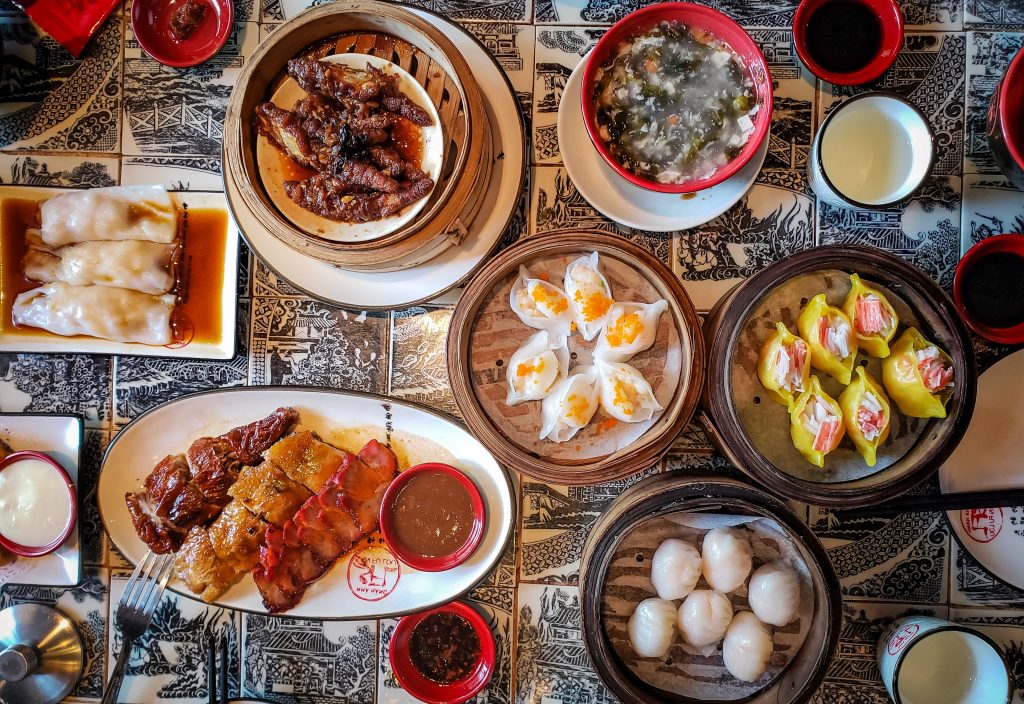
World Refugee Day
Some really exciting news is that June is World Refugee Awareness month, so let’s be aware! Here are five ways you can learn more about refugees in Spokane, WA!
- World Refugee Day is a day where we pause and reflect on the plight of these, our sisters and brothers. Attending a World Refugee celebration is a great starting point to see your refugee friends in action. Eat their food, buy their wares, listen to their music. Your heart won’t be the same! We will be celebrating World Refugee Day on June 17 at Nevada Playfield.
- Visit the MAC to see the exhibit Humaira Abid: Searching for Home, featuring the artwork of Seattle-based, Pakistan-born artist Humaira Abid. The beauty and mastery of Humaira’s woodcarvings of seemingly benign objects belie the upheaval and instability in society, especially that to which women are subject. Searching for Home presents a human-scaled look at the worldwide refugee crisis focusing on the plight of women and girls, who make up a disproportionate percentage of the millions who have fled their home countries as a result of political conflict and strife. The works demonstrate the artist’s ability to tread a narrow line between evocative (and often provocative) content and mastery in a material discipline.
- Eat a meal at Feast World Kitchen. Feast World Kitchen serves the best ethnic food in Spokane, and all of their food is prepared by refugees and immigrants. You can even meet the chefs when you are there. Food is available for dine in or take out.
- Watch a TED Talk. TEDxTalk: One Refugee’s Life Experience | Come Nzibarega Born and raised in Burundi, Come Nzibarega shares his story of escaping torture and civil war. Come was resettled by World Relief Spokane and is currently working as an Employment Specialist for World Relief Tri Cities. Hear more of his story and why Come thinks refugee camps are the richest places in the world.
- Gather your friends and family and participate in a refugee simulation at World Relief Spokane. You will gain a fresh perspective on what refugees face during their UNHCR interview as you participate in this immersive two-hour program.
- BONUS: Read a good book. Book: Inalienable: How Marginalized Kingdom Voices Can Help Save the American Church U.S. churches are at a critical crossroads — blurred lines between discipleship and partisanship have compromised our witness and confused our national and individual responses to refugees and “the stranger.” In a new book, pastor Eric Costanzo, missiologist Daniel Yang and World Relief’s Matthew Soerens find hope in the witness of global Christians, the poor and the ancient church.
The Drivers of Mass Displacement: Ukraine and Beyond
Nyakaar abandoned her home in South Sudan when armed conflict threatened her village. She found safety in the Bentiu Protection of Civilians camp, a U.N.-run camp for internally displaced South Sudanese people where World Relief operates health and nutrition programming. Shortly after arriving, Nyakaar gave birth to her son, Bone.
In the world today, a record-breaking 117.2 million people have been forced to flee their homes. That’s about 1 in every 78 people that live across the globe.*
While many of us think of refugees when we hear the words “mass displacement,” the majority of displaced people worldwide are actually internally displaced people like Nyakaar and Bone.
The causes of mass displacement are many, and the repercussions reach far and wide. Today, we’re taking a bird’s eye view of the topic of mass displacement to help you understand what causes people to leave their homes, who is fleeing and how people across the globe are joining World Relief to address the drivers of mass displacement and care for those who are displaced.
*These numbers reflect the latest estimates from the U.N. High Commissioner for Refugees. This blog was originally written May 10, 2022 and updated on April 11th, 2023.
What causes mass displacement?
People are displaced from their homes for myriad reasons — persecution, conflict, violence, human rights violations and climate-related factors to name a few.
The Russian invasion of Ukraine has been the most recent example of how war can force millions of people to flee their homes. However, there are many other conflicts and crises occurring in the world which are also causing people to flee their homes.
For example, violence in the Darfur region of Sudan has caused many to flee in search of a safe place to live, farm and raise their children. Some of these families remain internally displaced while others have fled across international borders into Chad and other surrounding countries. Apart from the unfolding crisis in Ukraine, 68% of the world’s refugees have come from the following five countries: Syria, Venezuela, Afghanistan, South Sudan and Myanmar. Though crises like these have received varying levels of media attention, the needs of the displaced remain critical.
Refugees, Asylum Seekers and IDPs
Many times, displaced people flee to regions or countries surrounding their home region, while a smaller percentage relocate to a more distant country. A displaced person can fall under several categories:
- Internally Displaced People
- Refugees
- Asylum Seekers
Internally Displaced People make up the largest category. These are people who have been displaced within their own country. They have been forced to flee their home and region, and have resettled in a different part of the same country in which they already lived. Currently, 61.2 million people are classed as Internally Displaced People.
Refugees make up the next largest group of displaced people. These are people who have fled war, violence, conflict or persecution and have crossed an international border to find safety in another country. It’s likely that you’ve read stories of refugees like Bohdan, Abdinasir and Amira — all people who left their home countries due to conflict or persecution, applied for refugee status and were resettled right here in the United States.
Today, there are about 29.3 million people with refugee status in the world.
In 2022, the U.S. has agreed to resettle up to 125,000 refugees plus an additional 100,000 Ukrainians who have fled the Russian invasion. As is evident, there are far more refugees in the world than can be resettled even in a country as large and as resourced as the U.S.
Asylum seekers make up the third and smallest category of displaced people. These are people who have fled to another country, but who have not yet been granted official refugee status. These women, men and children may have to wait years to receive an official status.
Currently, there are about 5.6 million asylum seekers living around the world today.
Host Communities
One final impacted group remains to be identified, and these are the host communities.
Host communities have not been displaced from their homes, but the swift influx of refugees into their communities severely impacts those who already lived in the region. Often host community members need the same support that refugees, asylum seekers and internally displaced people typically receive.
A large number of refugees can mean reduced access to land and water and can cause a scarcity in resources. For example, in Sudan, conflicts have broken out over land usage, as host communities and displaced people seek to utilize the scarce land and water resources available in the host community area.
World Relief works within these communities to increase access to clean water as well as facilitate peace committees to solve interpersonal conflicts before they grow.
What else is World Relief doing to help?
After a person is displaced, they can either choose to return to their home, or they can resettle in a new location. However, for many, the option to return home is not a viable one, as drivers of displacement often last for generations. World Relief is currently serving displaced people across the globe in several ways:
- In DR Congo, a country that’s facing one of the world’s worst hunger crises, World Relief works with host communities and with displaced people who have returned home by providing agricultural training and farming supplies to help families grow crops to feed their families and sell the surplus in local markets to earn an income.
- Globally, World Relief serves refugees who have crossed the border into our international countries of operation, working with local partners to provide emergency aid to families living in temporary shelters.
- In the U.S., World Relief partners with the U.S. government to resettle refugees. We also serve asylum seekers and other immigrants by providing community connections, legal services and other vital services like ESL classes, job training and more.
- In Sudan, South Sudan and DRC, World Relief serves internally displaced people by equipping local village peace committees and providing health, nutrition, WASH, education, agricultural programming and more.
- World Relief also advocates for the vulnerable when injustice occurs. We believe speaking up along with the poor and oppressed is an important witness to a watching world about the character of Jesus.
Mass displacement remains one of the largest and most challenging crises of our time — a truth that will take intentional coordination and investment between local and international communities, churches, governments and non-profit organizations to address.
At World Relief, we believe Jesus came to earth to love the vulnerable. Jesus didn’t bring hope and salvation from a distance. Instead, he came to us, showed us love and suffered with us. Whether we are welcoming refugees and asylum seekers into our own communities or providing relief to those displaced overseas, we get to be the hands of feet of Jesus, sharing his love to a world in need.
To learn more about how you can help refugees and displaced people in the U.S., visit our private sponsorship page.

Lydia Dawson served as World Relief’s Humanitarian and Disaster Response Unit Program Officer in Sudan, and in disaster response worldwide. Prior to joining World Relief, Lydia worked in homeless services and community development in Oregon and California. She is passionate about equity and honor for underrepresented groups, both locally and internationally.
Why is Immigration Legal Services Vital to Resettlement?
Immigration Legal Services (ILS) is an invaluable department in our Fox Valley office. Though their work is vital to the long-term integration of our refugee community, many community members are unaware of how much their work encompasses.
Our Community Engagement Manager, Karen Crisler, sat down with Phil Stoffel, our Immigration Legal Services Manager, to hear a little bit more about what it’s like to work in ILS.
Can you start by sharing what your role is at WR? And what exactly is ILS?
I am the ILS Manager and I am a Department of Justice (DOJ) accredited representative. This means that I am authorized by the DOJ to practice immigration law, within the context of World Relief. Reps are accredited every 3 years.
Our ILS program assist clients with a variety of services such as green cards, permanent residence, family reunification, citizenship, and travel documents. We do charge fees for our services but they are nominal compared to a private attorney, and we take into consideration the circumstances of each of our clients, especially when it comes to our larger families.
We exist to provide competent and affordable immigration services to refugees and immigrants who might not otherwise be able to afford or access legal services.
How is your work effected by global events?
Day to day, our work is based on our local resettlement numbers. 90% of the refugees we resettle return to our ILS team for help with their green card, citizenship, or other services.
That being said, we try to stay as ready as possible to respond to global events. One of the biggest ways we are doing that is by building up our ILS team. When I started it was just me. Now we have 2 DOJ reps, with a third to be hired soon. We also have an administrative assist and a contract attorney on our team.
A major global event that effected your work was the fall of Kabul in the fall of 2021. What has it been like working with our Afghan arrivals, especially in light of their unique immigration status?
The situation that caused Afghans to flee Kabul has created a lot of chaos.
When Kabul fell, we welcomed roughly 200 Afghan “parolees” in the Fox Valley. About half of those people worked with the U.S. government or military, and therefore qualified for Special Immigrant Visas (SIV), which we helped them apply for. For those with SIV status there is a pathway to a green card, and eventually citizenship.
The other half of parolees that didn’t qualify for SIV status are here lawfully and authorized to work for up to two years, but there is not a legal pathway to citizenship for them. This means that our contract attorney, Molly Smiltneek, and a team of pro-bono attorneys are working to help these parolees apply for “asylum” which is a complex, cumbersome process with no promise of success, but would create a legal pathway is granted. Nothing in immigration is guaranteed.
So unlike refugees, many Afghan parolees don’t have a guarantee at having a permanent status or long term work authorization. And, more significant than that, a large amount of people are separated from their family.
When it comes to Afghan reunification, most reunification is dependent on those here receiving permanent residence cards, and eventually citizenship. Typically, you can only apply for certain family members based on your permanent residency or citizenship, and in normal circumstances the reunification of a husband and wife can take 2-4 years at a minimum; often times longer. In some reunification cases, we get senators involved, and it’s difficult even for them to push cases forward.
About 50% of our program time goes to our Afghan population right now. It’s an opportunity to serve people, but many of these people have suffered.
What is the hardest part of your role? What is the most rewarding?
They are one and the same. It’s really challenging to have people sitting in front of you, living in the same place as you, but they don’t have the same rights as you. Especially challenging when they are separated from their family members. On some forms I have to ask clients where their parents are living – and many people don’t know. Many don’t even know if their family members are alive or not.
But the most rewarding part is when the work comes to fruition, and someone gets a green card or citizenship, or we get to see them reunited with their family after years apart.
That is a microcosm of the work we do – its heavy with longing and waiting, and on the other side is the joy of being reunited. Almost a glimpse of heaven in a way.
Can you share a reunification or citizenship story?
I worked with an individual who had to leave his pregnant wife behind when he came to the U.S.
He met with our ILS team when he got here, and we were able to file a petition for his wife and daughter to come join him. Fast forward four years and her case was finally approved. He was able to meet his four-year-old daughter for the first time and be reunited with his wife.
If you could help people understand one things about ILS, what would it be?
Most people who work in the field of ILS have the same goal: to serve the clients. But it’s hard because the government is ultimately in control of the processing. We can do as much as we can to get paper work in and out efficiently, but ultimately the government is in control of the speed. The truth is that there isn’t always pathway, and even if it exists, it takes so long. For example, in 2015 the processing time for a green card took around 8 months. Right now, green cards are taking about 36 months.
I am encouraged by our team though. We have a great team, a strong team. And, we have great clients. The work is never finished, but I feel like our staff is willing to take on the challenge. Our goal is to serve as many people well, as we can.
We are so grateful for Phil and the work his team accomplishes– the commitment of our ILS department is critical to the long term success of our refugee neighbors.
“When You Cook, You Have To Cook From Your Heart”
OPENING THE COMMERCIAL TEACHING KITCHEN IN KING COUNTY
Several years ago, World Relief Western Washington (WRWW) hosted a listening session where the local refugee-immigrant community could gather and openly share their needs, struggles, and hopes. What resulted was a dream we decided to help make a reality. With the support of funding from King Conservation District, The WA Commerce Department, the U.S. Small Business Administration, private donors, and generous architects and construction crews, we constructed a commercial teaching kitchen. Soon the 1,215 sq. ft. commercial teaching kitchen will be complete and open for programming including cooking and nutrition workshops and a food industry career pathway course!
Cooking is important to us. We learned this as we listened to the community. Through food we build community, sharing in each other’s joys and sorrows, and inspiring dreams as we nourish our bodies. Listen long enough to the stories of the people around you, and you will see this too.
“When you cook, you have to cook from your heart.”
—Cooking advice shared by a recent arrival from Afghanistan who loves experimenting with traditional recipes and cooking for his friends and family.
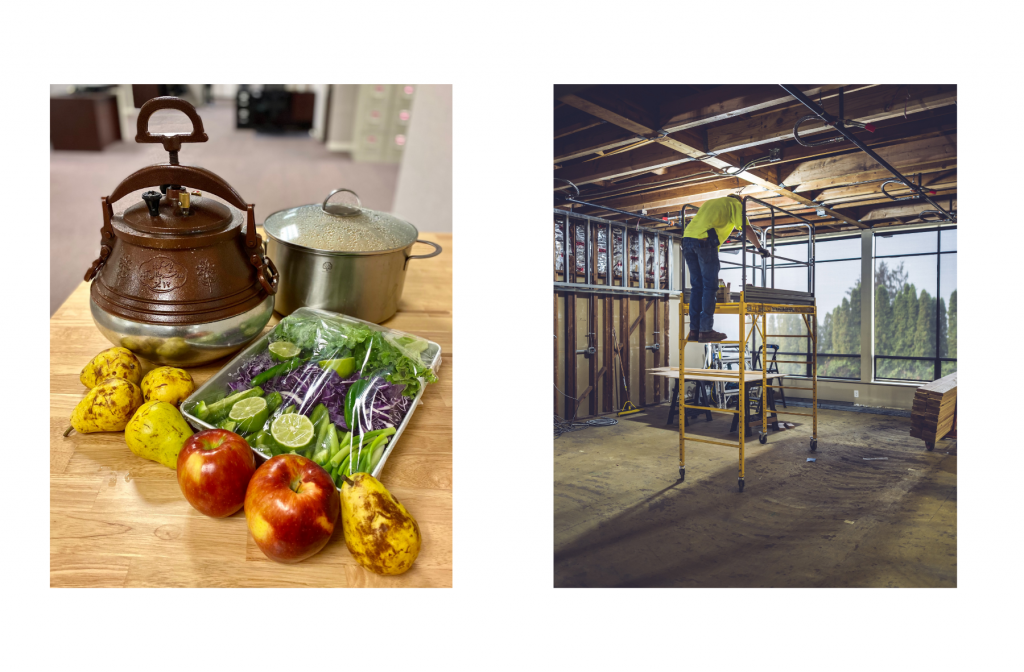
A KITCHEN TO GATHER PEOPLE
“I love to bring joy to people with my baking,” says Katya, a new arrival from Ukraine. “You become a part of people’s special events [when you bake food for them]. You become a part of the joy.” Katya owned a catering business back in Ukraine. Here in the US, she has found joy in preparing baked goods from recipes passed down from her grandmother. Her baked goods tell a story of her family and her homeland of Ukraine. Katya dreams of one day opening a bakery here in the US so more people can share her joy.
We are excited for Katya to be one of our featured guest chefs this summer in a series of cooking workshops hosted by WRWW. Through refugee and immigrant-led cooking classes, community members will have the opportunity to gather, learn from our new neighbors, and celebrate the diversity of our community. Through food we can appreciate the many cultures that shape our growing community.
Our food tells a story about where we are from and who we are now.
A KITCHEN TO BRING NOURISHMENT
Pausing to prepare food and eat reminds us of our human need. Our need for food is not undignified in its existence, but a sacred reminder of our humanity and our beautiful calling to nourish mind, body, and soul daily.
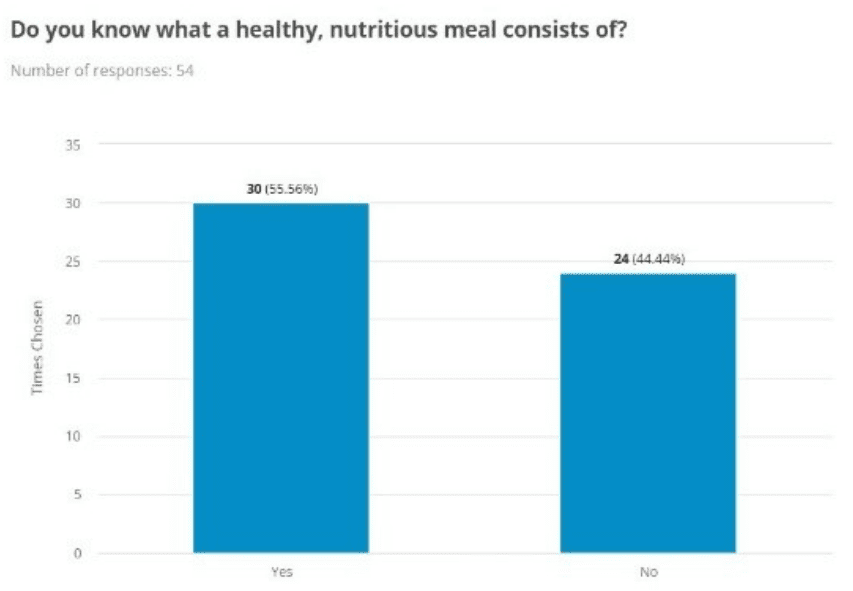
How we respond to our needs matters. The food we eat matters.
According to a May 2023 survey conducted by WRWW, a high percentage (approx. 44%) of refugee & immigrant respondents indicated that they do not know what a healthy, nutritious meal consists of.
The WRWW Commercial Teaching Kitchen will offer nutrition classes and healthy cooking workshops, equipping refugees and immigrants with the knowledge and skills they need to prepare nourishing food for themselves and their families.
Healthy food brings our bodies strength, healing and vitality.
A KITCHEN TO INSPIRE DREAMS
Refugees and immigrants arriving in Washington have left much behind. But they also bring so much with them. They bring pieces of their culture, creativity, ambition, skills and dreams. They come with so much to offer to our community.
World Relief Western Washington believes in the inherent resiliency of refugees and immigrants and is committed to coming alongside the refugee-immigrant community to equip them to thrive in their new home. Developing cooking skills and building knowledge and connections within the food industry provides refugees and immigrants with more opportunities for employment and creative economic endeavors. Programming won’t only focus on the culinary arts or business pathways. Workshops will be designed in such a way as to draw out creativity, instill confidence, and inspire dreams both new and old.
With the completion of the WRWW Commercial Teaching Kitchen we celebrate the realization of one dream and look forward to the start of many more!
The Church Has No Exit Plan
World Relief exists “to empower the local church to serve the most vulnerable.” On Wednesday, May 17, this was on full display, as World Relief Western NY hosted a Pastor’s Lunch at New Hope Free Methodist Church with President and CEO, Myal Greene.
“The church has no exit plan,” Myal Greene shared. Long after political views change and institutions leave, the church remains. If World Relief closes tomorrow (which it won’t), the local church will go on, serving those in the most vulnerable situations in Western NY and around the globe.
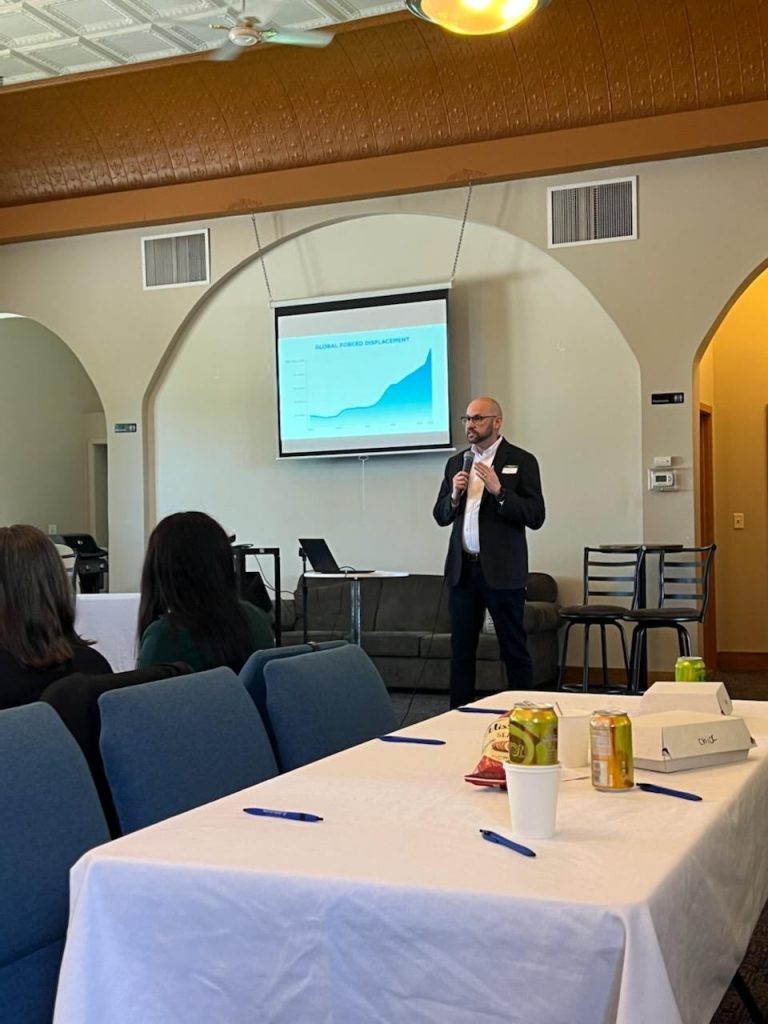
“The church is also best positioned to meet the needs of the vulnerable holistically.” At World Relief, we believe there are nine factors someone needs to meet to be stable: housing, language, employment, transportation, health & mental health, finances, school/youth, legal status, and community connections. As a resettlement agency, we do our best to help every client reach these nine stability factors in their first 90 days (about 3 months). That is the length of time we receive federal funding for as a Resettlement Agency. It is beyond difficult, and even if we succeed, what happens on day 91? 100? 200? The answer is the church. “The Church is God’s intended institution of restoration,” Myal continued, referencing Ephesians 3:10-11.
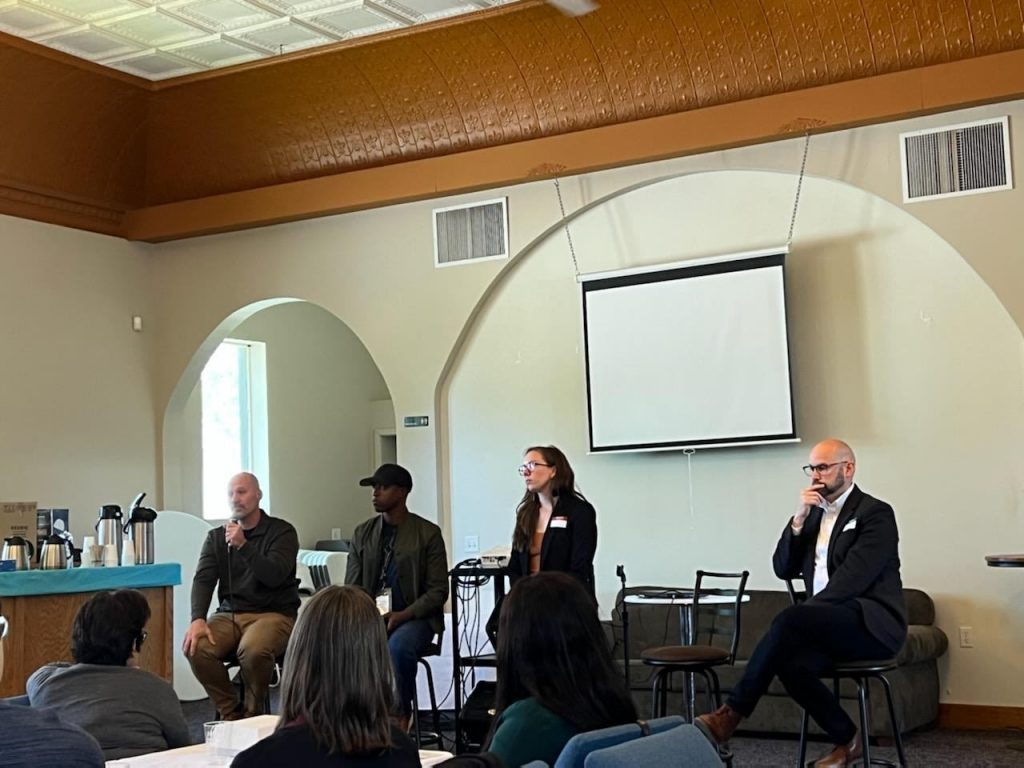
The audience didn’t need to take Myal’s words as the only evidence though. World Relief Western NY’s Church Mobilizer, Pastor Heritage Munyakuri, and Pastor Scott Sittig of New Hope Free Methodist Church, also shared their story. In 2006, Heritage and his family showed up to New Hope Church, 15 minutes before the service ended and speaking almost no English. 16 years later, they sat next to each other as friends and fellow pastors talking about how their friendship grew and transformed them, their families, and their churches. It was not always an easy journey, but it was full of joy and growth. “Scott became African,” Heritage joked, referencing the weekly 4-hour prayer times they held together. “I learned how to linger in God’s presence,” Scott shared in response.
“New Hope made me who I am…They planted the seeds in me that grew into who I am today,” Heritage shared. Now, as a pastor and employee at World Relief, he welcomes refugees and other immigrants just like he was welcomed all those years ago and challenges the local church here in Western NY to heed God’s commands and do the same.
We would love to have a conversation about what partnership could look like for your church.

By Eric Lantala
Eric is the Community Engagement Manager at World Relief Western NY, where he works with an amazing team to empower the local church to serve the most vulnerable. His primary passion in life is people, by way of loving God and his neighbor. If you want to see him in his natural environments, look for the nearest vegetable garden, music room, kitchen, dining room “podcast studio,” or, most importantly, anywhere where his wife and son are.
World Relief Argues Detaining Children Should Stay Off the Table
March 19, 2023
CONTACT:
Pinkston Team
wr@pinkston.co
World Relief is troubled by recent reports indicating that the Biden administration is considering the reinstatement of migrant detention policies utilized by previous administrations. Restoring these policies would allow the government to temporarily hold immigrant families – including young children – in jail-like facilities upon their arrival to the United States while they await a court hearing. As a Christian humanitarian organization, we remain steadfast in our opposition to inhumane policies that harm children, separate families, and create additional hardship for those fleeing violence and persecution.
“Families who have endured a dangerous journey to the U.S. border in order to seek asylum, seeking to avail themselves of protections offered under U.S. law to those who can demonstrate a credible fear of persecution, should not be held in jail-like detention facilities. Frankly, children never belong in such conditions,” said Aerlande Wontamo, Senior Vice President of US Programs at World Relief. “As Christians who believe each of these children and their parents are made in God’s image with inherent dignity, we hope and pray that reports that the Biden administration is considering reviving this process are inaccurate or at least that the broad opposition to such policies leads them to ultimately reject policies that would revive the practice of detaining children.”
World Relief calls on President Biden to fulfill his promise to “secure our border, while ensuring the dignity of migrants and upholding their legal right to seek asylum” by rejecting family detention policies and, instead, investing in more cost-efficient and humane alternatives.
“Among the many policy changes needed to ensure a more orderly asylum system and a more secure border, one change that the Biden administration ought not to consider is a revival of the unjust practice of detaining children in jail-like facilities. While not every family that arrives at the U.S.-Mexico border will qualify for asylum, it’s vital that each is afforded due process to present their case and that we treat everyone – and especially children, given their unique vulnerabilities – humanely,” said Matthew Soerens, Vice President of Policy & Advocacy at World Relief. “There is ample evidence that families who are placed into alternative detention programs will show up for their immigration court hearings in the vast majority of cases, and while we need Congress to invest in significantly increasing asylum adjudication capacity and legal representation for asylum-seeking families, detaining children while they wait for hearings should be off the table.”
To download a PDF version of this press release, click here.










